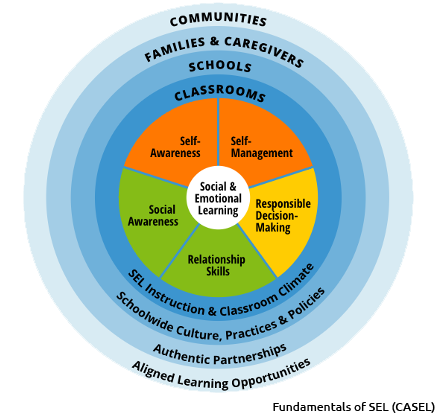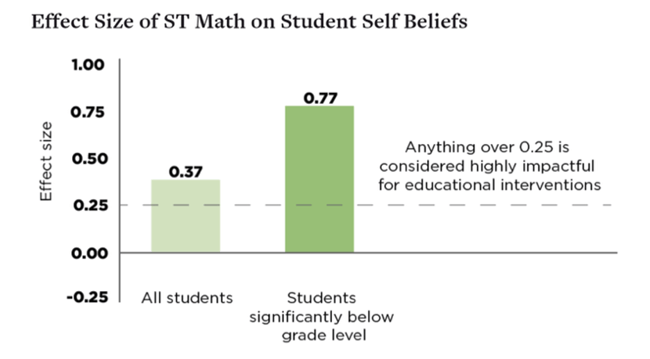Programs
Experience
Services
Educator Topics
Subscribe to the Newsletter
Subscribe to the Blog
In the short version, social emotional learning (SEL) is the development of skills that support the whole learner: mental wellbeing, a growth mindset, healthy relationship building, and responsible decision making. The definition has changed over time and by different organizations. One of the most referenced definitions is the one from the Collaborative for Academic, Social, and Emotional Learning (CASEL).
By incorporating an SEL-infused curriculum in everyday instruction, students can practice managing these experiences while showing kindness and empathy to their peers.
| Self-awareness - including growth mindset, self beliefs, self-efficacy. | |
| Self-management - including regulating emotions and behaviors, showing perseverance, employing delayed gratification. | |
| Social awareness - including experiencing empathy for others, recognition of others. | |
| Relationship skills - including communication skills, employing active listening, seeking help from others when needed. | |
| Responsible decision making - including open-mindedness, critical thinking and self-reflection |
 The value of teaching social emotional learning (SEL) skills is indisputable. Decades of SEL research and its effect on academic performance have linked the development of these skills to “higher student achievement, more positive student motivation and more socially acceptable classroom behaviors.”
The value of teaching social emotional learning (SEL) skills is indisputable. Decades of SEL research and its effect on academic performance have linked the development of these skills to “higher student achievement, more positive student motivation and more socially acceptable classroom behaviors.”
Incorporating SEL into class instruction improves not only social and emotional skills but also academic achievement. Results from a meta-analysis that looked across 213 studies involving more than 270,000 students found that:
Read the 2011 meta-analysis (Durlak et al., 2011). Research around the impact of SEL is primarily focused on programs that explicitly teach those skills. More recent SEL research suggests integrating academics with social emotional learning.
Video games can provide powerful learning experiences that reinforce critical SEL skills such as self-management, self-awareness, and relationship building. In a recent article published by the Education Development Center, mathematics researcher and psychologist Jessica Young explains, “Games [not only] help children identify and learn about patterns, number sense and spatial sense, but they also promote self-regulation, turn-taking, fair play, and learning from mistakes.”
ST Math helps redefine how students see themselves in relation to their ability to do math. While building academic success, at the same time, ST Math also increases students’ confidence, understanding, and motivation. Students who play ST Math have higher mathematics self-beliefs than non-ST Math students and ST Math’s impact on students’ self beliefs was strongest for students who started with low mathematics scores (Rutherford, et al).

Video games in particular are a great tool for honing SEL skills. Video games can:
Video games can provide powerful learning experiences that reinforce critical SEL skills such as self-management, self-awareness, and relationship building. In a recent article published by the Education Development Center, mathematics researcher and psychologist Jessica Young explains, “Games [not only] help children identify and learn about patterns, number sense and spatial sense, but they also promote self-regulation, turn-taking, fair play, and learning from mistakes.”
ST Math helps redefine how students see themselves in relation to their ability to do math. While building academic success, at the same time, ST Math also increases students’ confidence, understanding, and motivation. Students who play ST Math have higher mathematics self-beliefs than non-ST Math students and ST Math’s impact on students’ self beliefs was strongest for students who started with low mathematics scores (Rutherford, et al).

Video games in particular are a great tool for honing SEL skills. Video games can:
Let’s face it, math is emotional. When things click for students in math, it’s that much for rewarding…and when they don’t, it can be tough. An interesting thought is: is it possible the source of the frustration students feel stems from not being emotionally equipped to keep trying when their way of thinking isn’t validated?
The ST Math user experience incorporates several video games elements that are familiar to most students, the first being JiJi - the ST Math penguin. With each new puzzle, students form a personal connection with JiJi as a trusted, patient partner as they progress through the game.
By emphasizing strategy use, feedback, and collaboration students build confidence in achieving the objective. It is through the process of trial and error that the visual component begins to make all the difference. Our educators love knowing their students are not only further developing the mathematical skills needed for success in the classroom, but also impact how they FEEL in the classroom.
The value of teaching social emotional learning (SEL) skills is indisputable. Decades of SEL research and its effect on academic performance have linked the development of these skills to “higher student achievement, more positive student motivation and more socially acceptable classroom behaviors.”
Incorporating SEL into class instruction improves not only social and emotional skills but also academic achievement. Results from a meta-analysis that looked across 213 studies involving more than 270,000 students found that:
Read the 2011 meta-analysis (Durlak et al., 2011). Research around the impact of SEL is primarily focused on programs that explicitly teach those skills. More recent SEL research suggests integrating academics with social emotional learning.
Examples and insights from education leaders who’ve implemented personalized learning with successful student learning outcomes.
Read more about how personalized learning changed Live Oak »
Read more about Pickerington’s personalized learning model »
ST Math is a visual instructional program that builds a deep conceptual understanding of math through rigorous learning and creative problem solving to engage, motivate and challenge PreK-8 students toward higher achievement.
In ST Math, over 200 visual games create a unique pathway of interconnected content challenges to provide differentiated instruction for individual students, regardless of skill level.
Students take their own path to mastery. In order to move to new levels, they must demonstrate mastery at each stage of the objective. To ensure all students develop deep mathematical understanding, the program personalizes their exposure to each concept according to their unique needs. As a result, students are empowered to work through any obstacle as they make their own pathway to mastery.
“Our end-all, be-all goal is individualized, personalized, differentiated instruction. ST Math allows students to work at their own pace. It allows student to fill in some of those gaps that may have been missed in previous courses.”
“Taking teaching to the next level is really all about individualizing learning for all students. One way that we do that here at Marlboro Township is purposeful use of our digital tools. And ST Math is one of our digital tools that fills an important gap, which other digital tools do not.”